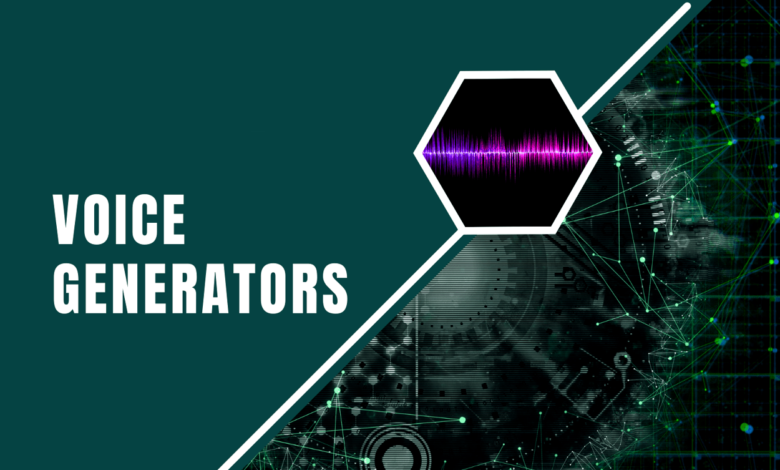The Ultimate Guide to the Top Voice Generator Tools in 2023

If you’re looking for an easy and effective way to create voiceovers, audiobooks, or even podcasts, then you’ll want to check out the top voice generator tools of 2023. With advances in technology, voice generators have become more accessible and user-friendly, making it easier than ever to create high-quality audio content. In this article, we’ll guide you through the top voice generator tools available in 2023 and help you choose the right one for your needs.
In the fast-paced digital world of today, audio content has become increasingly popular across various platforms. From podcasts and audiobooks to voiceovers for videos and presentations, having high-quality and engaging audio is essential. This is where voice generator tools come into play. These innovative software solutions leverage the power of artificial intelligence (AI) to convert written text into lifelike and natural-sounding voices.
In this comprehensive guide, we will explore the top voice generator tools in 2023. These tools offer a range of features, customization options, and high-quality voice output that can transform your written content into captivating audio. Whether you are a content creator, marketer, educator, or simply someone looking to add a professional touch to your audio projects, understanding the capabilities and benefits of voice generator tools is crucial.
Read more: Top 7 Voiceover Software Tools For 2023
What are Voice Generator Tools?
Voice generator tools are software applications that use text-to-speech technology to convert written text into spoken audio. The technology behind voice generators has improved dramatically over the years, and the resulting audio is now almost indistinguishable from that of a human voice.
Benefits of Voice Generator Tools
There are many benefits to using voice generator tools, including:
Saving time and effort: With a voice generator, you can quickly and easily create high-quality audio content without the need for professional voiceover services.
Consistency: Using a voice generator ensures that your audio content is consistent in tone and delivery, which can help build brand recognition.
Accessibility: Voice generators can make audio content more accessible to those with visual impairments or reading difficulties.
Cost-effective: Voice generators are generally more affordable than hiring a professional voiceover artist.
Top Voice Generator Tools in 2023

There are numerous voice generator tools available, each with its own set of features and capabilities. Here are the top ten voice generator tools in 2023:
NaturalReader
NaturalReader is a text-to-speech software with natural-sounding voices that can read any text aloud to you. With NaturalReader, you can convert any written text, such as Word documents, PDF files, and web pages, into spoken words. The software also includes features such as text highlighting and pronunciation editing.Amazon Polly
Amazon Polly is a cloud-based text-to-speech service that can generate natural-sounding voices in a variety of languages and accents. It can convert written text into spoken words in real-time, making it ideal for use in chatbots, virtual assistants, and other applications that require dynamic voice responses.
Google Text-to-Speech
Google Text-to-Speech is a built-in feature of Android devices that can read text aloud in over 40 languages. The software includes a wide range of voices and can be used to read eBooks, articles, and web pages aloud.
Voicepods
Voicepods is a web-based platform that can convert text into natural-sounding audio files. With Voicepods, you can create voiceovers for videos, podcasts, and other audio content quickly and easily. The platform includes a wide range of voices and languages to choose from.
Lyrebird
Lyrebird is an AI-powered voice generator that can create highly realistic-sounding voices based on just a few audio samples. Its advanced algorithms analyze the provided audio data to capture the unique characteristics of a person’s voice. This makes it a popular choice for voice cloning and creating custom voiceovers that closely resemble specific individuals.
Speechelo
Speechelo is a text-to-speech software that offers a variety of natural-sounding voices to convert text into audio. It provides a range of voice styles and accents, allowing you to customize the output to suit your content. Speechelo is often used for creating engaging voiceovers for videos, presentations, and commercials.
Zabaware Text-to-Speech Reader
Zabaware Text-to-Speech Reader is a versatile tool that converts text into spoken words. It includes multiple voices and provides various control options for adjusting the pitch, speed, and volume of the generated voice. The software supports a wide range of text formats, making it suitable for reading documents, emails, and web pages.
Acapela Group Virtual Speaker
Acapela Group Virtual Speaker is a comprehensive voice synthesis solution that offers a wide selection of voices and languages. It allows users to create high-quality audio content by converting written text into lifelike speech. The software also includes advanced features such as speech markup language support and customizable pronunciation rules.
ReadSpeaker
ReadSpeaker is a web-based platform that enables the conversion of written text into natural-sounding audio. It offers multiple voices and languages, allowing users to create audio content that suits their target audience. ReadSpeaker is commonly used in e-learning modules, accessibility solutions, and customer support applications.
TextAloud
TextAloud is a popular text-to-speech software that provides a range of voices and features. It allows users to convert text from various sources, such as documents, emails, and web pages, into spoken words. TextAloud offers customization options for voice selection, speed, and pronunciation, making it a versatile tool for generating audio content.
Features to Consider when Choosing a Voice Generator Tool
When selecting a voice generator tool, it’s important to consider the following features:
Voice Quality: Look for tools that provide high-quality, natural-sounding voices that resonate with your intended audience.
Language and Accent Support: Ensure the tool offers the languages and accents required for your specific project.
Customization Options: Check if the tool allows you to adjust parameters like pitch, speed, and volume to tailor the voice output to your needs.
File Export Formats: Consider the compatibility of the tool’s output formats with your intended applications (e.g., MP3, WAV, etc.).
Integration Capabilities: If you plan to use the tool in conjunction with other software or platforms, ensure it offers seamless integration options.
Pricing and Licensing: Evaluate the pricing structure and licensing terms to determine if they align with your budget and usage requirements.
How to Choose the Right Voice Generator Tool

To choose the right voice generator tool for your needs, follow these steps:
Identify Your Requirements: Determine the specific features and functionalities you need based on your project goals.
Research and Compare Tools: Conduct thorough research on the top voice generator tools, comparing their features, customer reviews, and pricing.
Try Demos or Free Trials: Take advantage of demos or free trials to test the tools and assess their usability and voice quality.
Consider User-Friendliness: Look for tools that have intuitive interfaces and user-friendly workflows to streamline your content creation process.
ReadSpeaker
ReadSpeaker is a web-based platform that enables the conversion of written text into natural-sounding audio. It offers multiple voices and languages, allowing users to create audio content that suits their target audience. ReadSpeaker is commonly used in e-learning modules, accessibility solutions, and customer support applications.
TextAloud
TextAloud is a popular text-to-speech software that provides a range of voices and features. It allows users to convert text from various sources, such as documents, emails, and web pages, into spoken words. TextAloud offers customization options for voice selection, speed, and pronunciation, making it a versatile tool for generating audio content.
Features to Consider when Choosing a Voice Generator Tool
When selecting a voice generator tool, it’s important to consider the following features:
Voice Quality: Look for tools that provide high-quality, natural-sounding voices that resonate with your intended audience.
Language and Accent Support: Ensure the tool offers the languages and accents required for your specific project.
Customization Options: Check if the tool allows you to adjust parameters like pitch, speed, and volume to tailor the voice output to your needs.
File Export Formats: Consider the compatibility of the tool’s output formats with your intended applications (e.g., MP3, WAV, etc.).
Integration Capabilities: If you plan to use the tool in conjunction with other software or platforms, ensure it offers seamless integration options.
Pricing and Licensing: Evaluate the pricing structure and licensing terms to determine if they align with your budget and usage requirements.
How to Choose the Right Voice Generator Tool
To choose the right voice generator tool for your needs, follow these steps:
Identify Your Requirements: Determine the specific features and functionalities you need based on your project goals.
Research and Compare Tools: Conduct thorough research on the top voice generator tools, comparing their features, customer reviews, and pricing.
Try Demos or Free Trials: Take advantage of demos or free trials to test the tools and assess their usability and voice quality.
Consider User-Friendliness: Look for tools that have intuitive interfaces and user-friendly workflows to streamline your content creation process.
Seek Recommendations: Reach out to professionals or colleagues who have experience with voice generator tools and ask for their recommendations.
Consider Long-Term Viability: Evaluate the reputation and track record of the tool provider to ensure long-term support and updates.
Read more: How to use the new voice-tweet feature on Twitter
Conclusion
Voice generator tools have revolutionized the way audio content is created. With the advancements in technology, these tools offer high-quality, natural-sounding voices that make it easier than ever to generate audio content for various purposes. By considering the features, user-friendliness, and compatibility with your specific requirements, you can choose the right voice generator tool that will enhance your content creation process.
FAQs
1. Can voice generator tools create voices in multiple languages?
Yes, many voice generator tools offer support for multiple languages, allowing you to create audio content in different language options.
2. Are voice generator tools suitable for professional voiceover work?
While voice generator tools have improved significantly, professional voiceover artists still offer a level of expertise and versatility that may be required for certain projects.
3. Can voice generator tools mimic specific accents or dialects?
Some voice generator tools provide options for different accents or dialects, but the level of accuracy may vary. It’s recommended to test the tool’s capabilities before committing to a project.
4. Are voice generator tools compatible with different platforms and devices?
Most voice generator tools are designed to be compatible with various platforms and devices, including desktop computers, laptops, smartphones, and tablets. However, it’s always recommended to check the system requirements of the specific tool you choose.
5. Can voice generator tools be used for commercial purposes?
The usage rights and licensing terms vary depending on the voice generator tool and its provider. Some tools may have restrictions on commercial use or may require separate licensing agreements. It’s important to review the terms and conditions before using the tool for commercial purposes.










